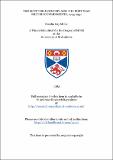The Scottish economy and the post-war British governments, 1945-1951
Abstract
The Scottish economy following the Second World War was faced with a multiplicity of problems : shortages of housing, skilled labour and raw materials, a declining share of the world market in their heavy industries and a higher unemployment level than Great Britain as a whole. The 1945-1951 years were a time of transition, not only from war to peace-time but also an adjustment to the continuation of war-time controls into peace-time. The 1945 Government retained a much greater amount of centralised power than had been the case following the First World War in 1918. The new Labour Government elected in July of 1945 had pledged itself to various sweeping social and economic reforms, such as nationalisation of many 'basic' industries. Attlee's Government was elected in 1945 on the crest of enthusiasm, a widespread feeling among Labour voters that a new age of Government responsibility was about to dawn. The Beveridge Report with its promise of 'freedom from want' and the Keynesian goals of 'full employment' and comprehensive social security were to be carried out largely with the aid of fiscal and monetary policy. The Scottish economy was mainly concentrated on very heavy industry - the so-called declining industries of coal, iron and steel and shipbuilding, with some very light industry such as textiles, especially jute. Through Regional Planning an attempt was made to bring new and light industry into Scotland, This was to be done by various means such as New Towns, Overspill, Development Areas, Industrial Estates, and Industrial Development Certificates. This thesis will thus attempt to analyse the 1945-1951 Scottish economy with special attention to employment, housing and industry. The relevant post-war Government economic policies will then be examined in this context.
Type
Thesis, MPhil Master of Philosophy
Collections
Items in the St Andrews Research Repository are protected by copyright, with all rights reserved, unless otherwise indicated.

